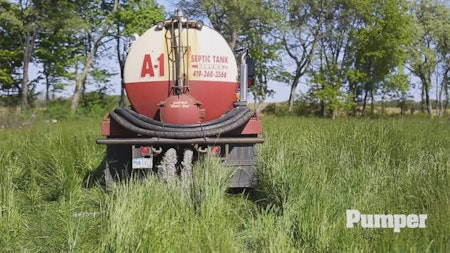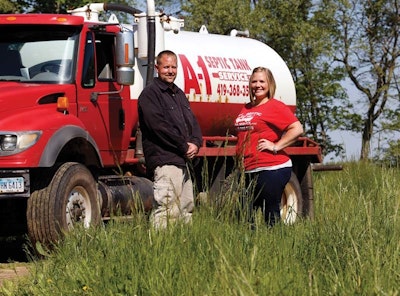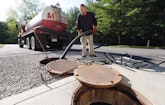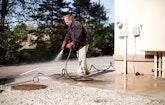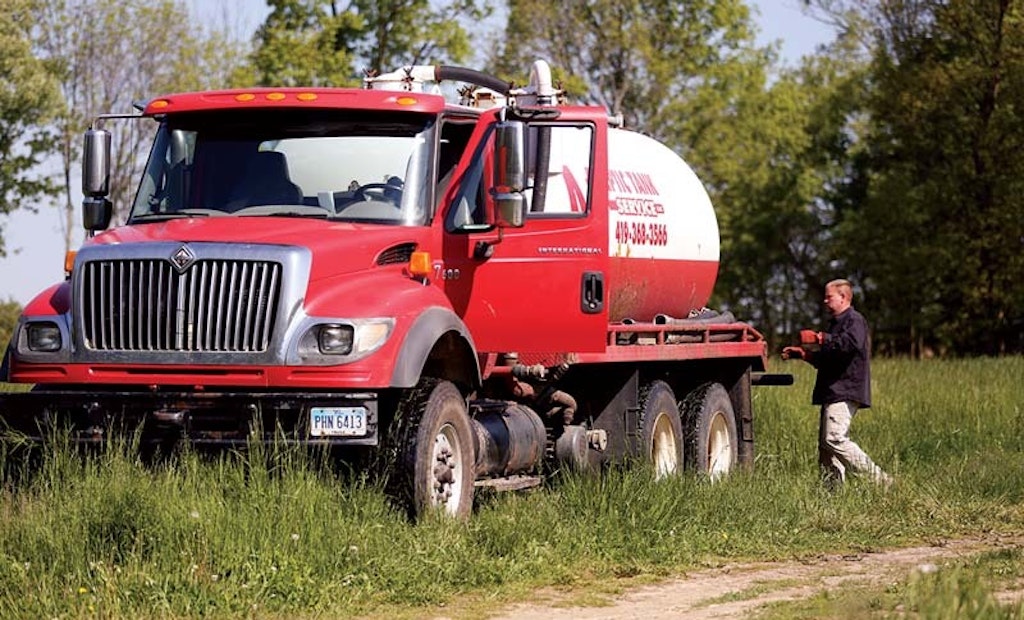
Interested in Portable Sanitation?
Get Portable Sanitation articles, news and videos right in your inbox! Sign up now.
Portable Sanitation + Get AlertsThe owners of A-1 Septic Tank Cleaning know what they want. Mike and Patti Mutchler have been operating the company to ensure that they have precisely as much as work as they need. They’re improving their brand through customer education and aiming to offer impeccable service. In the future, they hope to build on their grease trap service, augmented by land application of grease waste.
Based in Wooster, Ohio, about 60 miles south of Cleveland, the business was started by Mike’s great-uncles Ralph and Bob Mutchler in 1967. After a few years, the partners parted ways, splitting into two companies, one remaining in Ashland County.
“My dad, Dave, quit his job and bought the Ashland company in 1981, along with a 1979 Ford L800 with a 2,500-gallon tank,” says Mike. “My mom, Linda, answered the phone and handled the books. I was 4 years old and I remember it was rough going for the first year. My dad worked six or seven days a week to get his name out there and build the business.”
OWNERSHIP TRANSFER
Mike worked for his father part time through high school. After three years of work in concrete construction, he returned in the late 1990s. His father died in 2002 and Mike went into partnership with his mother, buying her out in 2008 when he was 33.
“Mike had a passion for what he did, but he also wanted to carry on the family business,” says Patti. “I took over the office duties and I remember being really nervous and excited about owning a business. Mike’s mom assured me that I could handle it and walked me through it.”
Today, the Mutchlers operate a business busier and more diverse than before. In addition to septic pumping, inspections and septic system repairs, A-1 offers restaurant grease trap pumping. The company is licensed to provide service in the five counties surrounding its office to a radius of 50 miles.
A-1 operates a single vacuum truck, a 2005 International 7600 with a 3,500-gallon steel tank built out by Ohio-based Marengo Fabricated Steel, Ltd. The pump is from Wallenstein.
About 90 percent of the business is devoted to septic tank pumping with some regular restroom pumping contracts at area campgrounds. For odor control at campgrounds, A-1 uses J-Disk fragrance enhancers and EverGreen tablets by J&J Chemical Company.
SPREADING GREASE
Mike has pushed the business into grease trap service with regular contracts to pump area restaurants, including KFC, Wendy’s, Panera Bread and Dairy Queen. On regular contracts, he pumps 16 grease traps a month.
The Mutchlers drive extra value from the contracts by spreading the grease trap waste on agricultural land — their own — avoiding the process of asking landowners for permission. The couple owns 15 acres and applied to the Ohio Environmental Protection Agency for a PTI, a permit to install a sewage disposal system, to spread the grease over 10 acres used to grow hay.
“There’s nothing you can do to treat grease so that its breakdown is accelerated. However, the growth of the hay keeps the nutrient value of the land down to regulated levels after application,’’ Mike explains. “The savings of land application are so great that we don’t even worry about selling the hay. A farmer round-bales the hay using his own equipment and then uses some of it for animal bedding. We leave the rest of the bales to decay naturally over time.”
Patti notes that the paperwork required to apply for the PTI required significant effort, including hiring an engineer to draw up a plan that would demonstrate how the waste would be spread and how runoff would be prevented, for example.
SPREADING SEPTAGE
Septage is applied on other land totaling about 400 acres across three sites, all owned by farmers who appreciate the free fertilizer. One of the farmers is the same one who bales their hay on the grease application site. The Mutchlers rent an additional 20 acres, also approved for land spreading.
Septage is first treated with dolomitic hydrated lime to control pH.
“I get the same results as quicklime over a little longer time, but it doesn’t burn like quicklime,” says Mike. “It’s much safer for customers and their kids and pets.”
Some waste is treated at the city of Ashland’s wastewater treatment plant. A recent job, for example, involved pumping out sludge from a package plant — a form of septic waste that can’t legally be land-applied in Ohio.
“We have to renew the PTI every five years,” says Patti. “For spreading septage we have to renew every year. Getting the permits for both types of land application was definitely worth the effort. We explain to the neighbors what we’re doing to make sure that they understand the process and they’ve definitely been OK with it.”
The regular income from scheduled grease trap service evens out the A-1 revenue stream, which the couple appreciates.
“I receive a lot of requests to handle additional restaurants in the same chains outside of the five counties I work in,” Mike says. “But that would mean extra driving, often for just one service call. Either I would need to work less-profitable runs or put another person on the payroll. I’ve tried paying people to help me on super-busy days, but it’s difficult to find someone who I would fully trust and who would be fully committed to working a business day where you can’t really be sure what time of day you’ll be finished.”
Mike is also interested in expanding to servicing more complex advanced septic treatment systems.
KEEP IT IN THE FAMILY
Rather than hire from outside, Mike and Patti are working to develop the next generation of business talent at home. They have three children: daughters Chloe (15) and Claudia (10), and son Caden (13).
“Caden helps me through the summer and Claudia asks me every day if she can go to work with me, so they’re my top candidates so far,” says Mike. “Personal skills are as important as eagerness to work.”
Patti handles accounting using QuickBooks — she likes the way it processes credit cards. She says that her early education in the septic service sector mirrors the education she now offers customers over the phone.
“I didn’t want Mike coming home after a hard day’s work and having to answer 5,000 questions,” she says. “I knew that being successful in the business meant knowing what I was talking about. If I don’t know something straight off, I promise to call back with an answer.”
Mike echoes those sentiments.
“For our business, education is everything,” he says. “Any customer needs to know how their septic system should operate. If someone calls and says the system is backing up, they need to know if the issue is with the septic tank or with the line. By now, regular customers know to check the water level at the tank. If the water level is down, it’s probably a drain problem. I’d rather they call a drain specialist if that’s what’s needed. I’m not a fan of spending other people’s money for no reason.”
REPAIRS AND INSPECTIONS
Mike traditionally brings an old-fashioned hand shovel to uncover septic tanks. There are several reasons for that.
“I’m a perfectionist,” he says. “With a shovel I can cut grass neatly and put everything back so you wouldn’t know I was there. More importantly, the homeowner is usually there and it gives me time to explain what I’m doing one to one. I often give them a diagram of their system to help them understand it.”
A-1 offers small septic tank repairs, including risers, lids and distribution boxes. Mike generally chooses parts supplied by Polylok. The company also offers septic tank inspections for real estate sales.
The couple’s steel barn measures 48 by 72 feet. Half of it is devoted to a shop where Mike performs routine truck maintenance and minor repairs, or shoots a few hoops to relax.
The company is as busy as the owners want it to be. Mike sets financial goals for a day, a week or a month and then works hard enough to achieve that. He generally works six days a week.
Patti says that repeat business keeps its bookings healthy. “We don’t do a lot of advertising,” she says. “We have a Facebook page and a (phone book) ad and that’s about it for advertising.”
WHAT ABOUT A NEW TRUCK?
The Mutchlers have attended the Water & Wastewater Equipment, Treatment & Transport Show for several years, taking continuing education courses together and checking out new equipment.
“Mike had his eye on a new Peterbilt with a 4,000-gallon tank,” says Patti. “But that may have to wait until we see about our kids joining the business.”
Real estate inspection basics
Mike and Patti Mutchler, co-owners of A-1 Septic Tank Cleaning, have found that septic inspections for the real estate sector provide a steady income stream, but take a lot of work to do it right.
Mike attends local board of Realtor meetings to keep on top of the industry. While inspections are not required prior to a real estate transaction, buyers often push for them.
“They’re not required, but they should be,” says Patti.
A-1 works closely with county boards of health to get septic tank drawings and permits from their systems prior to inspections.
“We also direct our customers to the boards when we find issues with the septic systems and they need to be repaired or replaced,” says Patti. “Communication is key.”
Mike notes that many pumping companies offer inspections, but the methodology of the inspections varies widely.
“We should all be on the same page,” he says. “I use a lot of the operation and maintenance inspector program guidelines from the University of Minnesota and Jim Anderson and Dave Gustafson, and they’re very thorough. I do dye tests using dye strips, usually from Norlab Inc. I dig up outlet ends of tanks, check baffles and pipe structure and tank integrity, and check the leach system. They’re a good moneymaker, but it takes time to do them right. You need to be honest and protect all parties involved — buyers need to be protected and sellers need to be protected from a lawsuit six months down the road.”
Patti agrees. “You need to serve the customer with integrity and honesty, no matter what the inspection shows.”
